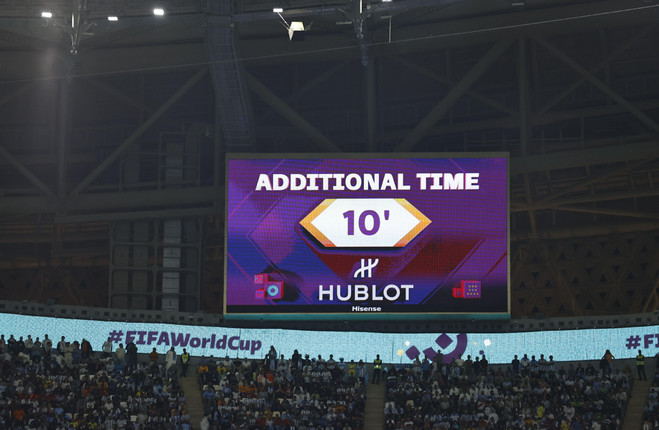THE PREMIER LEAGUE is back but Michael Owen is worried.
Not by the sportswashing and financial distortion of the nation states or the shadow cast by the alleged fraud of the serial champions or the capture of advertising space by gambling companies or the crazy salaries and spiralling debts or the pricing out of fans.
No no, none of that stuff.
“So depressing to read that the majority of games are going to last over 100 minutes”, tweeted Owen recently in reaction to the new directive of adding time to added time. “Far better ways to combat this issue than to simply keep adding time.”
Owen is presumably worried that hundred-minute matches are dangerously close the runtime of a standard movie.
But this column has sympathy with Owen’s view. In fact, we are going to come out and say that, on this one, Michael is exactly right.
The Premier League will this season adopt the additional additional time principle we’ve seen at the most recent editions of the men’s and women’s World Cups, so expect to see games stretching to beyond 100 minutes, and the kind of added time we haven’t seen since Alex Ferguson was prowling touchlines, pointing at this watch. Dirk Kuyt’s record for the latest goal in Premier League history (101′ 48″) may have fallen by Saturday night. (Even Arsenal’s equaliser against Man City in Saturday’s Community Shield brushed closely against it.)
The directive was handed down by dusty lawmakers IFAB, to reward fans with more ‘ball in play time’, and so referees have been told to more strictly recover the time ‘lost’ to substitutions, goal celebrations, red cards and, above all, time-wasting.
It seems this will be less perishable than most early-season emphases, so won’t go the way of the seriously-this-time-we-really-mean-it policing of penalty-box grappling from corners that are enforced for a fortnight and then quickly forgotten.
We saw it in action across the English Football League at the weekend, where 33 of the 35 games crossed the 100-minute threshold. The average amount of additional time came to 16 minutes and 34 seconds.
The players are on Michael Owen’s side on this one.
“It doesn’t make much sense”, said Kevin de Bruyne.
Twitte-, sorry, X Blue subscriber Raphael Varane posted his considered thoughts.
“From the managers and players, we have shared our concerns for many years now that there are too many games, the schedule is overcrowded and it’s at a dangerous level for players’ physical and mental wellbeing. Despite our previous feedback, they have now recommended for next season: longer games, more intensity, and less emotions to be shown by players.”
Varane has quit international duty over fear of burnout, so his opinion should be respected. This will naturally be dismissed in some quarters as a millionaire complaining about an extra quarter-hour’s work, but there is a brutal intensity to the Premier League, perhaps more mentally than physically exhausting.
Additional additional time also takes away one of the few bulwarks of the underdog. In a competition as crassly stratified as the Premier League, time-wasting is a necessary act. Gavin Bazunu infamously took 13 minutes over his goal-kicks in the title-denting draw with Arsenal last season, but there was no chance Southampton could have competed in that game if they did not slow it down.
There is a more highfalutin point to be made here too, on the relativity of time-wasting. Opponents do it at certain points in the match to slow down a team’s momentum, but there is no guarantee that the dominant team will have that same momentum – or, more tangibly, the same players on the pitch – when the wasted minutes are added on at the end.
It would be much better to punish time-wasting in the moment rather than compensate for it at the end. Referees should instead get liberal in booking players running down the clock, and should be reminded of the six-second rule, which seems to have been most recently enforced against Simon Mignolet in 2015.
But the biggest problem of the normalising of 100-minute-plus matches is its meddling with the ancient rhythms of the sport. It has already challenged tradition, with the BBC’s Mark Chapman saying on 5 Live on Saturday that venerable results-round-up show Sports Report would begin after 5pm for the first time in its 75-year history.
And what of us? Additional additional time wrecks our carefully-calibrated sense of timing, of being able to guess with deep satisfaction the number about to be flashed upon the board. Beyond this, it is no longer possible to carve just two hours out of a day to watch a football match. Now we must negotiate another 20 minutes for ourselves and these extra parcels of time will accrue.
Who knows how many of life’s wonders will be lost to us now that we must extort from somewhere the time to watch Luton Town’s rudimentary chase of a late equaliser against Brighton.
Additional additional time – and the prospect of additional additional additional time – is the wrong answer because, frankly, we just don’t have the time.

